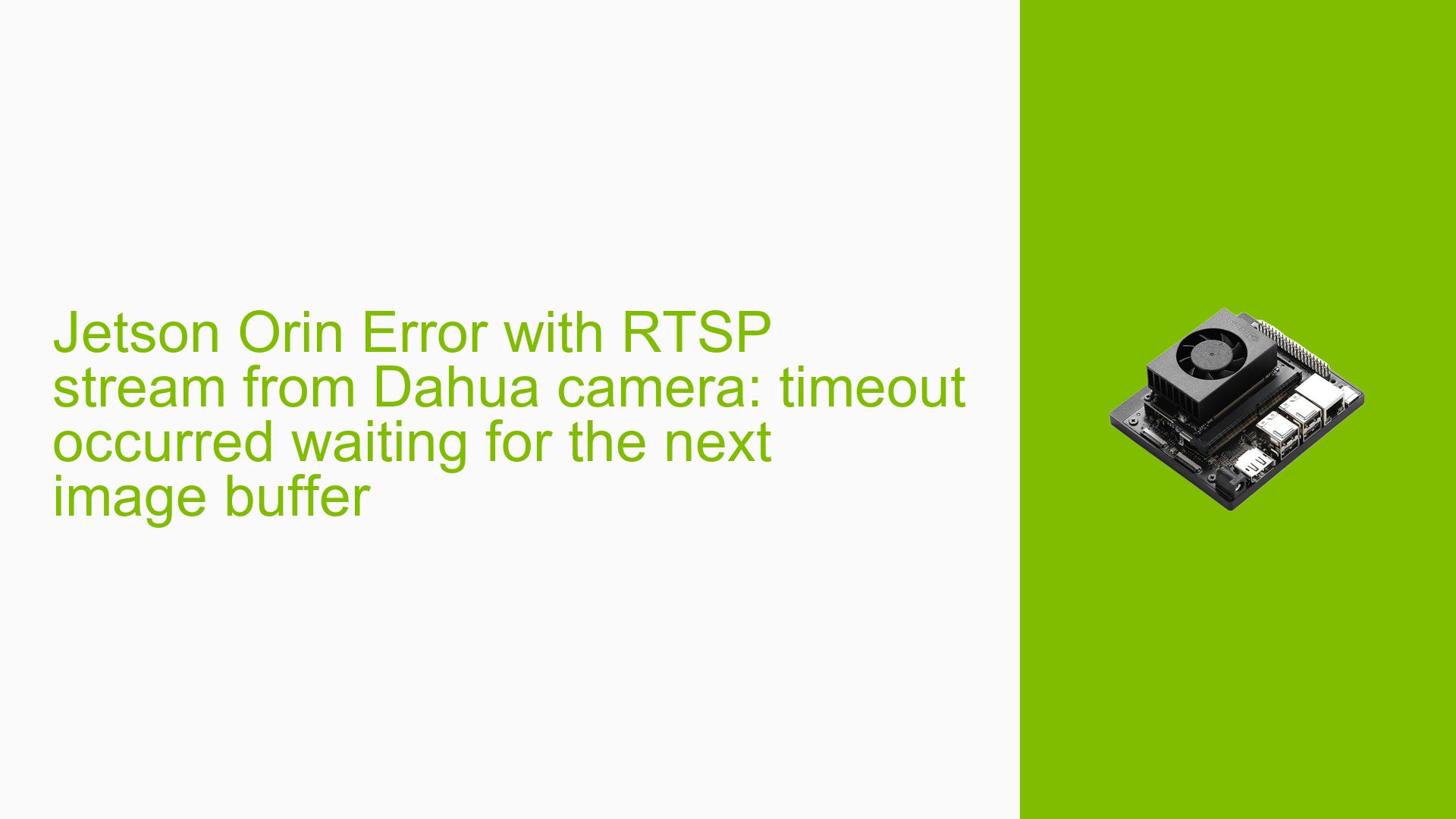Jetson Orin Error with RTSP stream from Dahua camera: timeout occurred waiting for the next image buffer
Issue Overview
Users are experiencing an error while attempting to set up a WebRTC stream using the Nvidia Jetson Orin Nano Developer Kit. The specific error encountered is:
[gstreamer] gstDecoder::Capture() – a timeout occurred waiting for the next image buffer.
This issue arises when executing the video-viewer command with an RTSP stream URL, particularly during the initialization of the GStreamer pipeline.
Symptoms
-
Error Messages: Users report various GStreamer errors, including:
- Timeout waiting for the next image buffer.
- Resource discovery and auto-negotiation failures.
- Missing or invalid IP port in the RTSP URI.
- Failure to create encoder pipelines due to missing elements such as
x264enc.
-
Context: The problem occurs when users attempt to stream video from Dahua cameras using different codecs (H264 and H265) and various RTSP URLs.
Hardware and Software Specifications
- Hardware: Nvidia Jetson Orin Nano Developer Kit.
- Software: GStreamer version 1.16.3.0; various plugins including
gstreamer1.0-plugins-ugly.
Frequency and Impact
The issue appears to be consistent among users attempting similar setups, significantly impacting their ability to utilize video streaming capabilities effectively.
Possible Causes
-
Hardware Limitations: The Orin Nano does not have a built-in hardware encoder, which necessitates the use of software encoders.
-
Software Bugs or Conflicts: Issues may arise from conflicts between installed GStreamer plugins, particularly with
gstreamer1.0-plugins-ugly, which includes essential encoders likex264enc. -
Configuration Errors: Incorrect RTSP URI formatting or codec specifications can lead to failures in establishing a connection or decoding streams.
-
Driver Issues: Outdated or incompatible drivers may affect the performance of GStreamer components.
-
User Errors: Misconfigurations in command syntax or RTSP URL structures can lead to errors.
Troubleshooting Steps, Solutions & Fixes
Step-by-Step Instructions
-
Validate RTSP URI:
- Use tools like
ffmpegorvlcto ensure that your RTSP URL is correct and accessible.
- Use tools like
-
Test GStreamer Pipeline:
- Execute the following command to check if the issue is specific to
video-viewer:gst-launch-1.0 rtspsrc location="rtsp://login:[email protected]/profile" ! decodebin ! autovideosink
- Execute the following command to check if the issue is specific to
-
Inspect Installed Plugins:
- Check if
x264encis available:gst-inspect-1.0 x264enc - If it returns "No such element or plugin ‘x264enc’", this indicates that the necessary plugin is not installed.
- Check if
-
Clear GStreamer Cache:
- Clear the GStreamer registry cache to refresh available plugins:
rm ~/.cache/gstreamer-1.0/registry.aarch64.bin
- Clear the GStreamer registry cache to refresh available plugins:
-
Install Necessary Plugins:
- If you need
x264enc, consider reinstallinggstreamer1.0-plugins-ugly, as it contains essential encoding plugins. - Alternatively, explore using Jetson Multimedia API for encoding tasks as suggested by forum users.
- If you need
-
Test with Different Codecs:
- Experiment with both H264 and H265 codecs in your commands to see if one works better than the other.
-
Modify Command Syntax:
- Ensure that your command syntax is correct, especially regarding special characters in URLs (e.g., replacing ‘&’ with ‘&’).
Recommended Approach
If multiple users reported success after reinstalling gstreamer1.0-plugins-ugly, it is advisable to follow this route if you encounter issues related to missing encoder elements.
Best Practices
-
Regularly update your Jetson Nano software and GStreamer plugins to ensure compatibility and access to new features.
-
Maintain a backup of working configurations for quick recovery in case of future issues.
Unresolved Aspects
Some users noted ongoing issues without clear resolutions, particularly regarding alternative encoders when gstreamer1.0-plugins-ugly cannot be used. Further investigation into available plugins and potential updates from Nvidia may be necessary for long-term solutions.
